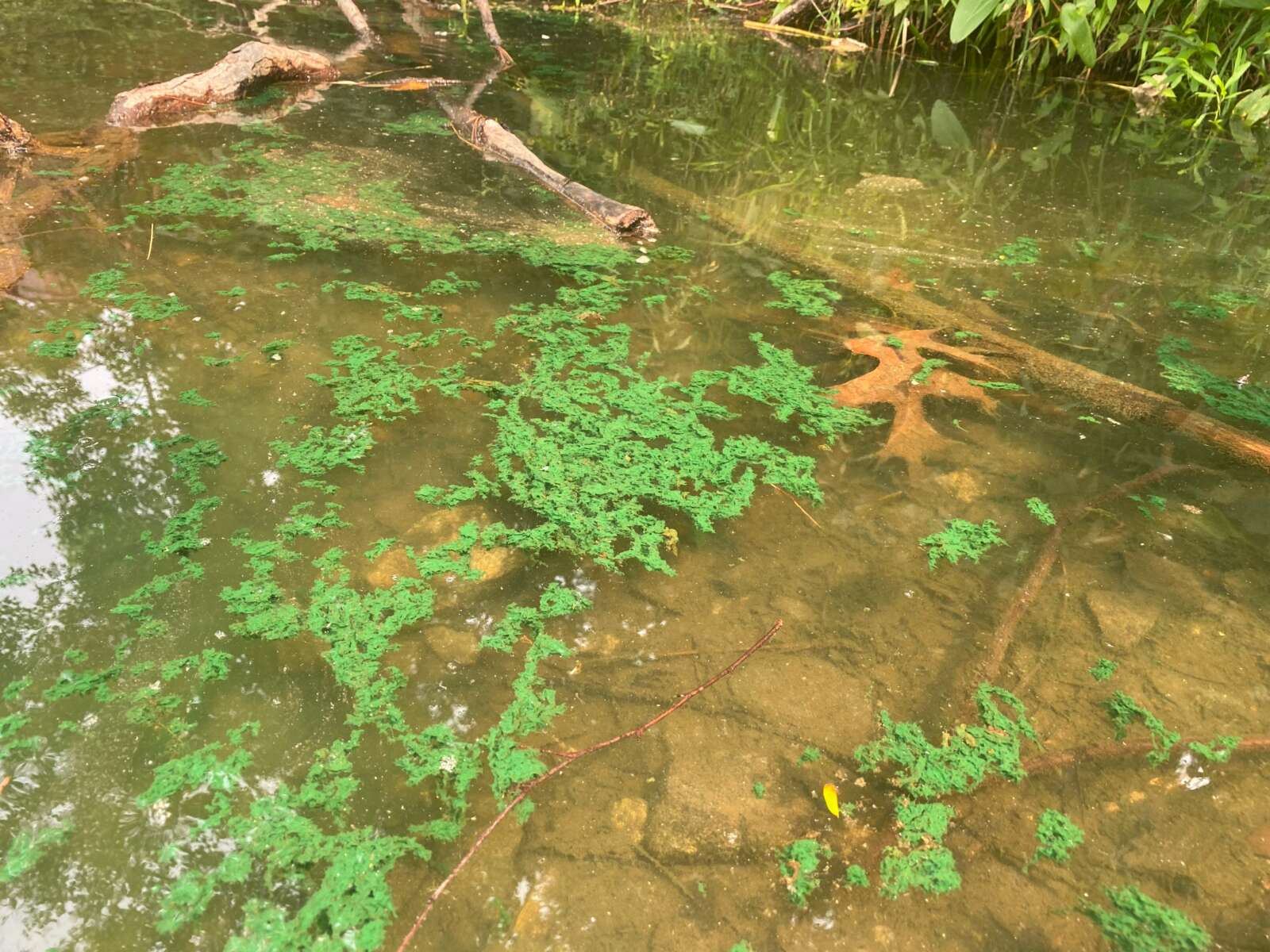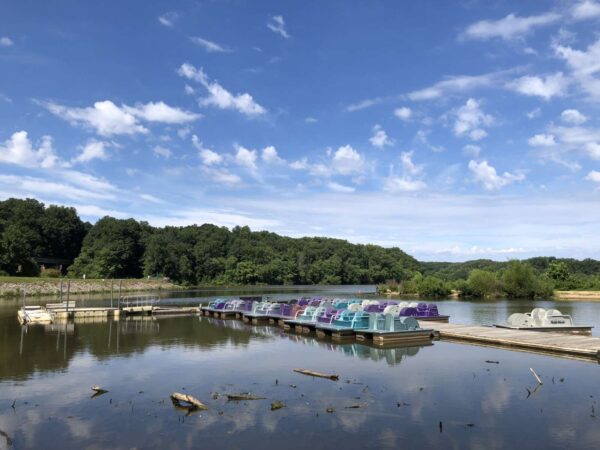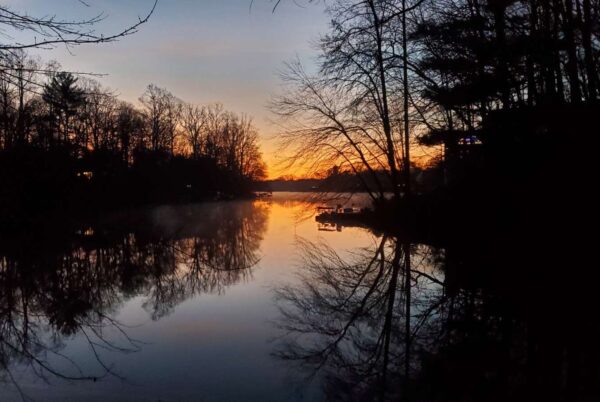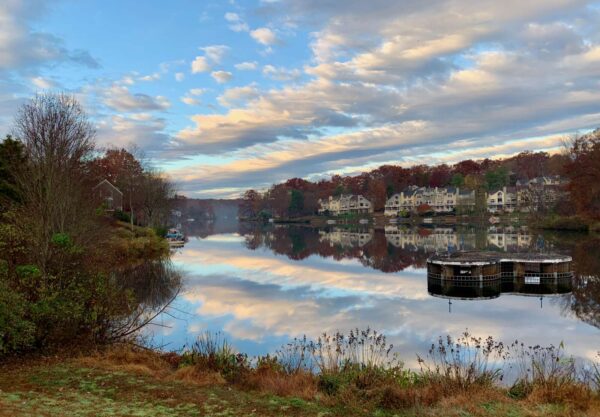
Lake Anne and Lake Audubon in Reston are now clear of harmful algae that bloomed on the surface of the lakes last week.
Reston Association staff had reported “potentially harmful” algae in both lakes. Staff worked with an environmental contractor to determine if Lake Audubon was clear of the algae Wednesday afternoon (Aug. 9). Lake Anne was previously reported as safe.
“The bloom began after hot weather allowed cyanobacteria to thrive which was then enhanced further by an influx of nutrients that came from a water main break that flowed into Snakeden Branch last week,” RA Chief Operating Officer Peter Lusk said.
Specifically, Dolichospermum was found — a potentially harmful cyanobacteria. The bacteria found in Lake Anne, however, is not considered harmful.
RA had previously encouraged residents to avoid contact with the lake water. The bloom at Lake Anne was mostly limited to the east of the lake near Wiehle Avenue.
The water main break referenced by Lusk occurred the morning of Aug. 4 behind Hunters Woods Plaza, contributing to the deaths of a number of fish found in Snakeden Branch stream, according to RA.

The price tag affixed to dredging Lake Accotink has led some on the Fairfax County Board of Supervisors to say it might be time to pull the plug on restoration plans.
The Fairfax County park is popular, with over 250,000 visitors each year, but in a presentation to the board’s environmental committee yesterday (Tuesday), staff said the cost of the much-needed dredging project would be astronomical.
The basic cost of dredging alone is estimated at around $95.3 million, with additional dredging events for maintenance costing up to $300 million total by the 20-year mark.
Suggesting that the lake could be turned into a wetland, the staff report said that 43% of the sediment in the park would need to be removed, and costs of removing and disposing of the sediment are higher than originally estimated.
Alternative options, like damming the lake to create an “offline lake” separate from Accotink Creek, still came in as too expensive to be recommended.
A survey conducted after the staff report came out in February found respondents split over whether the lake should still be dredged, though “no” votes eeked out a 1% lead. Some commenters questioned the cost estimates and the county’s management of the park.
“It brings me no joy to come here with a recommendation to not proceed with dredging,” said Christopher Herrington, director of the Department of Public Works and Environmental Services. “I have an appreciation of the deep connection some residents have with the lake, so it brings me no joy to disappoint them.”
Herrington said the additional costs of continued maintenance dredging is really the nail in the coffin for the Lake Accotink dredging evaluation.
Board of Supervisors Chair Jeff McKay expressed personal disappointment with the results of the staff report.
“As someone who has used this park since I was a child, it brings me no joy to hear that,” McKay said. “There’s profound disappointment in the decision staff has made here. Not because there wasn’t a thorough investigation…I have a hard time stomaching the recommendations.”
While many on the board balked at the cost of dredging, Braddock District Supervisor James Walkinshaw said more answers are needed before a final decision can be made.
“A lot of folks are angry and hurt that we’re talking about not keeping that commitment,” Walkinshaw said. “This lake has hundreds, thousands, of very strong impassioned supporters. The new cost estimates are eye popping, but I’m not ready to give up. If board not willing to commit resources to fully dredge, we owe people a lot more answers.”

A new workgroup focused on ensuring the equitable enjoyment of Reston’s lakes for all is seeking members.
Formed on Dec. 15 by Reston Association’s Board of Directors, the Lakes Equity Work Group aims to “maximize the enjoyment of Reston’s four man-made lakes for all RA members, their families and friends,” according to a release by RA.
So far, the group plans to create an equity framework to delineate current use policies, usage disaggregated by demographics and ways to focus on equity and improved access for all. Some focus areas include improving access to lakes, equal opportunities for recreation and the installation of non-discriminatory signage and use policies for all.
RA’s Board Operations Committee will interview candidates at their Feb. 6 meeting, after which the board will select the final members at its Feb. 23 board meeting.
The eight-member group will include one voting RA staff representative and two non-voting staff liaisons.
The application can be found online. It asks candidates to detail their relevant experience and what their goals and objectives would be for the working group. Applications are due by next Friday (Jan. 27).
The group plans to begin work in March. A draft report is set to go before the board in the fourth quarter of the year.

Lake Audubon — a man-made lake in Reston — may soon chart new waters with a new name.
Reston Association’s Board of Directors has begun preliminary conversations to consider launching a community dialogue on potentially renaming the lake, which is named after 19th century artist and known enslaver John James Audubon.
The move, pitched by at-large director John Farrell, would kickstart a community dialogue on the possibility of a name change. Early next year, Farrell and others will host an exploratory meeting with area stakeholders to discuss whether or not there is interest in changing the name of the lake.
“It seems to me that there needs to be a reconciliation of our fundamental founding principles of inclusion with this guy’s history,” Farrell said at a Dec. 15 board meeting.
Audubon enslaved at least nine people and was publicly dismissive of the abolitionist movement.
Earlier this month, the Fairfax County Board of Supervisors voted to rename Lee District to Franconia District. The effort is part of a series of moves to disentangle the county from names honoring Confederate leaders.
Farrell pointed to two articles from Audubon Magazine that highlight Audubon’s history, which state that he enslaved several people and didn’t recognize black and indigenous people as equals. They also highlight a story in which Audubon returned a family of escaped slaves to their enslavers and say the ornithologist was “prone to exaggeration,” writing about discovered birds that did not exist.
In October 2021, the Audubon Naturalist Society — a major US conservation group — said it will change its name due to the “pain” caused by Audubon.
“The deliberate and thoughtful decision to change our name is part of our ongoing commitment to creating a larger and more diverse community of people who treasure the natural world and work to preserve it. It has become clear that this will never be fully possible with the current name,” ANS Executive Director Lisa Alexander said in a news report on the issue.
Audobon is famed for his studies of American birds.

Reston Association is working on the creation of an equity group with a focus on its lakes.
If created, the work group would focus on maximizing the enjoyment of Reston’s four man-made lakes for its members.
“The Equity Working Group will develop an equity framework that clearly defines current use policies, usage by demographics, opportunities for improvement and make policy recommendations that focus on equity and improved access for all,” says a proposal set to go before RA’s Board of Directors at its meeting tonight.
The group could focus on improving access to lakes, equal opportunities for recreation, and non-discriminatory signage or use policies.
Reston has four man-made lakes: Lake Anne, Lake Thoreau, Lake Audubon and Lake Newport, which collectively span 125 acres.
According to the meeting agenda, the proposed group could consist of:
- A voting member representative from each of the four lake communities
- Four voting member representatives from non-lake condominium or apartment communities in each district
- A voting staff representative selected by RA’s CEO
- Two non-voting staff liaisons, including RA’s watershed manager and human resources director
The idea came at the suggestion of director Erwin Flashman and board president Sarah Selvaraj-D’Souza.

